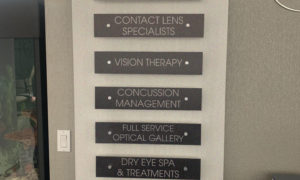
Photo credit: Getty Images
How best to invest in and manage life insurance.
By Vittorio Mena, OD, MS
April 24, 2024
With the summer months approaching, many of us will take precautions to avoid getting burned by the sun and damaging our skin and eyes.
In this column, I will tackle how we can avoid getting burned financially. One way to do that is by purchasing the right kind of life insurance and using it for its proper purpose.
Get Your Finances in Shape
As we try our best to get our beach bods into shape and be physically fit, we also need to work toward financial fitness.
We need to build a solid financial foundation to reach our goals, whether that be practice ownership, a house, a vacation home, a Disney cruise every year or just a comfortable retirement.
I want you to pretend you have the ability to build your dream three-story home from scratch. Typically, to build a home, the architect and future homeowner have to come up with a blueprint with the designs and plumbing/electricity created before the house is built.
The same rules apply when it comes to our finances.
Creating a Blueprint for Financial Success
I want you to think of each floor of that house you are building as different accounts. The first floor is the emergency account. The second floor is the short-term account. The third floor is the wealth-building account. The roof is what protects everything we build from water damage and storms.
Creating a Secure Foundation with an Emergency Fund
Today we are focusing on the first floor. Whenever an unexpected emergency happens, people typically find themselves going into credit card debt or pulling from their retirement. Their lives start going backwards instead of forward.
If we do not have an emergency fund in place, or insurance to protect us, we are essentially sitting ducks. Insurance is defense and investments are offense. At least one unexpected event with high expenses is likely to happen in our lifetime. To help you deal with that unexpected event(s), you should have: malpractice insurance, disability insurance, long-term care insurance and life insurance.
Other Articles to Explore
Approaching Life Insurance the Right Way
We don’t know if we will ever be sued or become disabled, but we all know for sure that we will eventually die. For that reason, we all should have a life insurance policy, which should be used for its proper purpose.
One should never mix insurance and investments together. Insurance agents often will say there are tax incentives or advantages to using life insurance as an investment strategy, but what they really mean is the death benefit is tax-free.
Any money that grows in your “cash value” account in your life insurance policy will be taxed as capital gains, and you only get around 3-4 percent on your money, which is equivalent to the historical inflation rate. That means, in essence, that you only break even on your investment. Meanwhile, the insurance company makes out like a bandit on you.
Why Term Life Insurance is Best
Term life insurance is typically the way to go since we (or our family) need it only for a temporary period and not for our entire lives.
As we get older and near retirement, our need for life insurance decreases because our loans and homes have been paid off and our kids are grown.
Insurance agents tell us we need permanent life insurance forever, and not only that, but that we should have more insurance the older we get. The icing on the cake is they not only try to sell permanent life insurance to a customer, but try to sell both permanent and term as separate polices. This approach to life insurance can cost us a fortune.
The other misconception is how best to optimize the life insurance provided by our employer. When you have a policy that is provided by your employer, the golden rule is to take whatever is free.
Then, you want to purchase term insurance independently elsewhere because you will continue to have that policy if you decide to change jobs or lose employment. You can decide to COBRA it, but it can become more costly over time.
Also, the policies given at work offer very low coverages when it comes to the death benefit and typically only cover 1-2 years of your current salary.
Pro Tip:
- Never buy any kind of “cash value” or whole life insurance including universal life
- Never buy life insurance as an investment
- Never buy life insurance that pays dividends
A smart life insurance game plan will leave a legacy for your family members and loved ones in case everything goes wrong.
Stay tuned for my next column to learn how to build the next level of your financial house. As they say, Rome wasn’t built in a day!
 Vittorio Mena OD, MS, is the sports vision director with Optical Academy. Dr. Mena is also an Optometric Financial Planner, with Series 6 and 63 investment licenses and Series 2-14 life and variable annuity licenses. To contact him: menavitt@gmail.com
Vittorio Mena OD, MS, is the sports vision director with Optical Academy. Dr. Mena is also an Optometric Financial Planner, with Series 6 and 63 investment licenses and Series 2-14 life and variable annuity licenses. To contact him: menavitt@gmail.com

























